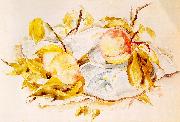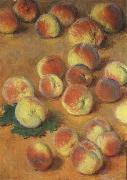
|
Demuth, Charles
|
|||
|
|
|||
| American Precisionist Painter, 1883-1935 American painter and illustrator. He was deeply attached to Lancaster, where his family had run a tobacco shop since 1770. Although not a Regionalist, Demuth maintained a strongly localized sense of place, and Lancaster provided him with much of the characteristic subject-matter of both his early and later work. He trained in Philadelphia at the Drexel Institute of Art, Science and Industry (1901-5) and at the Pennsylvania Academy of the Fine Arts (1905-11), where his teachers included Thomas Anshutz, Henry McCarter (1864-1942), Hugh Breckenridge (1870-1937) and William Merritt Chase. | |||
|
|
|||
|
Peaches new3/Demuth, Charles_2AjPEm.jpg Painting ID:: 18984 |
1923, watercolor on paper, Philadelphia Museum of Art | ||
|
|
|||
|
Claude Monet
|
|||
|
|
|||
| French Impressionist Painter, 1840-1926 Claude Oscar Monet (14 November 1840 C 5 December 1926) was a founder of French impressionist painting, and the most consistent and prolific practitioner of the movement's philosophy of expressing one's perceptions before nature, especially as applied to plein-air landscape painting. The term Impressionism is derived from the title of his painting. Claude Monet was born on 14 November 1840 on the fifth floor of 45 rue Laffitte, in the ninth arrondissement of Paris . He was the second son of Claude-Adolphe and Louise-Justine Aubree Monet, both of them second-generation Parisians. On 20 May 1841, he was baptised into the local church parish, Notre-Dame-de-Lorette as Oscar-Claude. In 1845, his family moved to Le Havre in Normandy. His father wanted him to go into the family grocery store business, but Claude Monet wanted to become an artist. His mother was a singer. On the first of April 1851, Monet entered the Le Havre secondary school of the arts. He first became known locally for his charcoal caricatures, which he would sell for ten to twenty francs. Monet also undertook his first drawing lessons from Jacques-François Ochard, a former student of Jacques-Louis David. On the beaches of Normandy in about 1856/1857 he met fellow artist Eugene Boudin who became his mentor and taught him to use oil paints. Boudin taught Monet "en plein air" (outdoor) techniques for painting. On 28 January 1857 his mother died. He was 16 years old when he left school, and went to live with his widowed childless aunt, Marie-Jeanne Lecadre. After several difficult months following the death of Camille on 5 September 1879, a grief-stricken Monet (resolving never to be mired in poverty again) began in earnest to create some of his best paintings of the 19th century. During the early 1880s Monet painted several groups of landscapes and seascapes in what he considered to be campaigns to document the French countryside. His extensive campaigns evolved into his series' paintings. Camille Monet had become ill with tuberculosis in 1876. Pregnant with her second child she gave birth to Michel Monet in March 1878. In 1878 the Monets temporarily moved into the home of Ernest Hosched, (1837-1891), a wealthy department store owner and patron of the arts. Both families then shared a house in Vetheuil during the summer. After her husband (Ernest Hoschede) became bankrupt, and left in 1878 for Belgium, in September 1879, and while Monet continued to live in the house in Vetheuil; Alice Hosched helped Monet to raise his two sons, Jean and Michel, by taking them to Paris to live alongside her own six children. They were Blanche, Germaine, Suzanne, Marthe, Jean-Pierre, and Jacques. In the spring of 1880 Alice Hosched and all the children left Paris and rejoined Monet still living in the house in Vetheuil. In 1881 all of them moved to Poissy which Monet hated. From the doorway of the little train between Vernon and Gasny he discovered Giverny. In April 1883 they moved to Vernon, then to a house in Giverny, Eure, in Upper Normandy, where he planted a large garden where he painted for much of the rest of his life. Following the death of her estranged husband, Alice Hosched married Claude Monet in 1892. | |||
|
|
|||
|
Peaches new10/Claude Monet-745365.jpg Painting ID:: 34841 |
mk97 1883 | ||
|
|
|||
|
Hirst, Claude Raguet
|
|||
|
|
|||
| American Painter, 1855-1942 | |||
|
|
|||
|
Peaches new12/Hirst, Claude Raguet-845456.jpg Painting ID:: 39161 |
mk143 mk143 c.1885-88 Watercolor on paper 11x18in | ||
|
|
|||
|
Georg Flegel
|
|||
|
|
|||
| 1566-1638 Georg Flegel Location German painter. He was the son of a shoemaker, and not being a Roman Catholic, probably moved to Vienna after 1580, when the Counter-Reformation began to take effect in Olmetz. In Vienna he became the assistant of Lucas van Valckenborch I, whom he subsequently followed to Frankfurt, then an important centre for art dealing and publishing. He filled in staffage in van Valckenborch pictures of the seasons and portraits, inserting fruit, table utensils and flowers as still-life set pieces. His faithful reproduction of flowers and fruit drew on watercolours by Derer, still-life painters from the Netherlands living in Frankfurt, and botanical and zoological illustrations by Joris Hoefnagel, Pieter van der Borcht IV and Carolus Clusius (1525-1609) then being published in Frankfurt. | |||
|
|
|||
|
Peaches new26/Georg Flegel-668785.jpg Painting ID:: 97096 |
circa 1630(1630) Medium oil on panel cyf | ||
|
|
|||
|
Also Buy::. For Following Paintings / Artists / Products, Please Use Our Search Online: |











